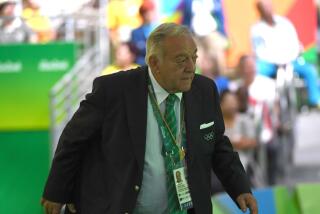Lawyers Doubt Theory of Ben Johnson Sabotage
- Share via
TORONTO — There appears to be no evidence to support a conspiracy theory involving Carl Lewis to sabotage Ben Johnson’s drug test in the 1988 Summer Olympics, said the senior counsel for the Canadian government’s commission of inquiry into drug use by athletes.
In a surprise twist to a bizarre day of testimony, Robert P. Armstrong interrupted proceedings Monday to tell the commission’s chairman, Charles L. Dubin, that lawyers--including Johnson’s--agreed that there probably was no basis to the theory.
“In light of the public statements made following the disqualification of Ben Johnson in Seoul, we as counsel and our investigators considered it our obligation to make a thorough investigation of the sabotage theory relating to the stranger in the doping control room,” Armstrong read from a prepared statement.
“That investigation has led us . . . to conclude at this stage that it would not advance your work to pursue that theory.”
Lewis finished second to Johnson in the 100 meters at Seoul but was awarded the gold medal after a drug test revealed traces of a banned anabolic steroid, stanozolol, in the Canadian sprinter’s system.
Johnson’s coach, Charlie Francis, testified before the commission last month that Johnson had not used stanozolol for more than a year before the Olympics and suggested that an unidentified stranger in the doping control area had tampered with Johnson’s drink before the drug test.
Francis testified that two witnesses, including Johnson’s physical therapist, Waldemar Matuszewski, had told him the stranger spoke to Lewis in the doping control area.
Armstrong never appeared to place much credence in Francis’ theory. A more credible theory was subsequently advanced by another of Francis’ athletes, Angella Taylor Issajenko, who suggested that Johnson’s doctor, Jamie Astaphan, had treated the sprinter with stanozolol but led him to believe he was receiving a different steroid.
Armstrong’s made his statement Monday during testimony by Matuszewski, who acknowledged that he had seen the stranger in the room. But the physical therapist said he had not been concerned about him. He said he later signed a form approving the testing procedure, a copy of which was submitted to the inquiry as evidence. Johnson also had signed the form.
Matuszewski also testified that he had administered what he suspected were steroids to at least one Canadian athlete--quarter-miler Mike Sokolowski--and assumed many others were also on the drugs.
The Warsaw-born Matuszewski told Dubin that Italy’s top sprinter, Pierfrancesco Pavoni, once hit him in the face with a leather belt and threatened him for refusing to administer treatment.
Matuszewski denied that he had administered steroids to the Italian national champion, who was in Canada for several months of training before the Seoul Games.
Sokolowski earlier had testified that he saw Matuszewski prepare a syringe with steroids and vitamins and inject them into Pavoni.
Matuszewski, 42, said he had been involved in a steroid scandal in Poland 15 years ago and made it a point never to broach the subject with Johnson, his teammates or with Astaphan.
“I never asked but I knew,” he said. “Only steroids would build muscles like that.”
In a related development, Juan Antonio Samaranch, the president of the International Olympic Committee, said at the opening of Sunday’s IOC executive board meetings at Barcelona that Johnson should not have been banned for life by Canada’s sports ministry from competing internationally for the country.
“He must not get more sanctions because he is Johnson,” Samaranch said. “This is not fair.”
Johnson received the standard suspension of two years from the International Amateur Athletic Federation, which governs track and field.
More to Read
Go beyond the scoreboard
Get the latest on L.A.'s teams in the daily Sports Report newsletter.
You may occasionally receive promotional content from the Los Angeles Times.





